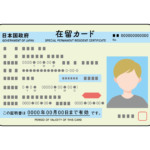list of residence statuses in Japan │ What are the types of work visas?
In Japan, there are a total of 29 types of residence status (as of April 2022), 23 of which allow the holder to work. There are strict criteria to determine eligibility. Therefore, you need to make a careful decision depending on your residence plans, including your plans for permanent residency and naturalization.
Residence statuses that allow you to work
There are 24 types of residency status with which you can work, and appropriateness is judged based on the nature of your work and the content of your work. The legal classification is roughly divided into the following four categories.
- Diplomats, professors, etc. (Article 1-1 of the Immigration Control and Refugee Recognition Act)
- Residency status with landing permission criteria (Article 1-2 of the Immigration Control and Refugee Recognition Act)
- Residency status based on residence, not the content of activities in Japan (Article 2 of the Immigration Control and Refugee Recognition Act)
- Residency status based on the content of individual activities (Specific Activities / Article 1-5 of the Immigration Control and Refugee Recognition Act))
The following table first explains the total of 23 types (1) to (3), as it is easier to assess their applicability, and then type (4) – specific activities related to labor qualifications.
Residence statues in Article 1-1 of the Immigration Control and Refugee Recognition Act
The following 6 types of residence status are listed in Article 1-1 of the Immigration Control and Refugee Recognition Act (Immigration Act). Some of them are difficult to distinguish from the residence statuses with landing permission criteria listed in Aricle 1-2. You must carefully decide based on the presence or absence of compensation, the place of employment, and the content of your work.
| Status of residence | Qualified persons | Duration of residence |
| Diplomat | Foreign government ambassadors, ministers, etc. and their families | Period of diplomatic activity |
| Official | Foreign government officials and their families | 5 years, 3 years, 1 year, 3 months, 30 days or 15 days |
| Professor | University professors, etc. | 5 years, 3 years, 1 year or 3 months |
| Artist | Painter, composer, sculptor, etc. | 5 years, 3 years, 1 year or 3 months |
| Religious activities | Clergy dispatched from foreign religious groups, etc. | 5 years, 3 years, 1 year or 3 months |
| Journalist | Foreign journalists, cameramen, etc. | 5 years, 3 years, 1 year or 3 months |
Residence statues in Article 1-2 of the Immigration Control and Refugee Recognition Act
Residence statuses with landing permission criteria are listed in Article 1-2 of the Immigration Control and Refugee Recognition Act. Most people qualify for the Technical/Humanistic Skills/International Work qualification, which covers a wide range of general office work.
| Status of residence | Qualified persons | Duration of residence |
| Highly skilled foreign professional(I-II) | Those engaged in advanced academic research activities, specialized/technical activities, business/ management activities, etc. | (I) 5 years(II) indefinite |
| Business manager | company presidents,managers, etc. | 5 years, 3 years, 1 year, June, 4 months or 3 months |
| Legal/Accounting services | attorneys, public accountants, etc. | 5 years, 3 years, 1 year or 3 months |
| Medical services | doctors, nurces, etc. | 5 years, 3 years, 1 year or 3 months |
| Researcher | Researchers of public and private institutions | 5 years, 3 years, 1 year or 3 months |
| Instructor | Language teachers in high schools and secondary schools, etc. | 5 years, 3 years, 1 year or 3 months |
| Engineer/Specialist in humanities/International services | Various office jobs, interpreters, designers, language teachers for companies, etc. | 5 years, 3 years, 1 year or 3 months |
| Intra-company transferee | Transfer from an office abroad | 5 years, 3 years, 1 year or 3 months |
| Nursing care | Certified care worker | 5 years, 3 years, 1 year or 3 months |
| Entertainer | Singers, actors, professional players, etc. | 3 years, 1 year, 6 months, 3 months or 15 days |
| Skilled labor | Foreign chefs, sports coaches, etc. | 5 years, 3 years, 1 year or 3 months |
| Specified skilled worker(I-II) | Individuals who have skills and knowledge of Japanese and work in 14 specific industries. | (I) Up to 1 year, up to 5 years in total(II) Up to 3 years, no limit on the total duration |
| Technical intern training(I-III) | Those who receive practical training based on a specific plan | Period individually determined by the Minister of Justice(No. 1 is up to 1 year, No. 2 is up to 2 years). |
Residence Statuses in Article 2 of the Immigration Control and Refugee Recognition Act [residental status]
There are no restrictions on activities for people with a residence status based on a residence permit. You are free to freely work and earn an income.
| Status of residence | Qualified persons | Duration of residence |
| Permanent resident | Those to whom the Minister of Justice has issued a permanent residence permit | Indefinite |
| Spouse/Child of a Japanese citizen | Spouse of a Japanese citizen, specially adopted child, or natural child of a Japanese citizen | 5 years, 3 years, 1 year, or 6 months |
| Spouse/child of a permanent resident | Spouse of a permanent resident or child of a permanent resident who was born in Japan and continues to reside there | 5 years, 3 years, 1 year, or 6 months |
| Long-term residents | Individuals whose residence is authorized by the Minister of Justice by establishing a specific period of residence | 5 years, 3 years, 1 year or 6 monthsAlternatively, the period may be determined individually by the Minister of Justice within a range not exceeding 5 years |
What you need to know when applying for or changing a work qualification
If you begin the process of applying for or changing your residency status after you have found a job, make sure you complete the process in time. If you obtain a highly specialized position in a company or research institution, actively use the points-based system established for highly skilled foreign professionals.
The following are the main points of a work visa.
Residence status distinction [For work visa]
There are strict screening criteria for each type of residency status. If you have two qualifications and no particular preference, you need to determine the correct qualification based on actual working conditions.
[Example] If you work as a language teacher
- If you teach in a private language course → “Engineer/Specialist in humanities/International services"
- If you teach employees of a trading company, etc. → “Engineer/Specialist in humanities/International services"
- If you teach at a college or a vocational school school → “Professor"
- If you teach at an elementary school, junior high school, high school, etc. → “Instructor"
[Example] If you work in arts, culture, sports, etc. in Japan
- If you work for an income → “art"
- If you participate in activities without pay → “Cultural activities" *
- If you perform in a concert or live show → “Entertainment"
- If you work as a lecturer at a college, etc. → “Professor"
* Activities that generate income are not allowed
Advantages of using the highly-skilled professional point system
There is a “points-based preferential Immigration Treatment for Highly Skilled Foreign Professionals" for highly specialized occupations such as academic research and IT related jobs. Points are calculated based on evaluation criteria such as education level, work experience, annual income, age, etc. If you reach a certain number of points, you can obtain “advanced professional" residency status.
Qualifications are divided into two categories (I and II) and entitle you to preferential treatment that does not exist for other job-related qualifications.
▼Merits for highly specialized professionals
- The length of stay is “5 years" or “indefinite"
- Spouses are allowed to work
- They can bring family members and domestic workers
- Priority immigration and residency procedures
- Requirements for permanent residency are relaxed and you can apply even if you have not lived in Japan for long
What is the “designated activities" status of residence
If you do not qualify for any of the other employment statuses, you may qualify for “designated activity" residency status.
Designated Activities -activities defined by the Immigration Act – are “special research activities" such as managing research projects at designated institutions (or companies that you manage yourself) and “specific information processing activities" for IT engineers of a designated organization. If you apply for a residence permit to perform these types of activities, your spouse and children are allowed to stay with you and perform the same activities.
The grounds for staying in Japan to engage in “designated activities" are stated in the notice by the Minister of Justice, and “undeclared designated activities" are approved on a case-by-case basis, primarily for humanitarian reasons.
▼Examples of publicly designated activities
- Domestic workers (when a diplomat or highly specialized professional is the employer).
- Working holidays, internships
- Construction/production workers
▼Examples of publicly undeclared designated activities
- Job hunting for international students
- When a foreign resident, etc., brings a parent from abroad and provides continuous support
- When a child, spouse, etc., on a family residence visa finds employment in Japan
Status of residence without a work permit
If you have a residence status that does not allow you to work, you will need a separate “Permit for Activities Outside Qualification Status" to earn income from part-time employment or a part-time job. If you wish to work while in Japan, you will need to change your residence status in order to work. The qualifications listed below apply to this.
Qualifications in Article 1-3-4 of the Immigration Control and Refugee Recognition Act
The residence statuses that cannot be used for work are listed in Article 1.3.4 of the Immigration Control and Refugee Recognition Act. If you have only a short-term residence status and wish to continue to stay in Japan, you should consider applying for a change of residence status.
| Status of residence | Qualified individuals | Duration of residence |
| Cultural activities | Persons engaged in artistic activities without income, researchers of Japanese culture, etc. | 3 years, 1 year, 6 months or 3 months |
| Short stay | Tourists, conference attendees, etc. | 90 days, 30 days orPeriod in units of days within 15 days |
| Student | University students, etc. | Individual period of time determined by the Minister of Justice(within a range of not more than 4 years and 3 months) |
| Researcher | Individuals undergoing training in domestic companies, etc. | Period determined by the Minister of Justice(Within a range of not more than 4 years and 3 months). |
| Family stay | Family members of foreigners with one of the previously introduced residence statuses (except for those with specified qualification No. 1 and training of technical trainees) | Period determined by the Minister of Justice(Within 5 years) |
Designated activity statuses that do not allow you to work.
Among the residence statuses for designated activities, there are those that allow you to work and those that do not. If you are changing your visa to study abroad because you are seeking employment and want to work part-time, you must obtain a “permission to engage in activities other than permitted under the status of residence".
Read the activities described in the designation carefully to understand what activities are allowed for you in Japan.
Application for Permanent Residence/Naturalization
Permanent residence and naturalization (acquisition of Japanese citizenship) are granted only to those who are able to live a stable life in Japa. Therefore, you may not be able to apply no matter how long you have lived in Japan.
Residence statuses that allow you to apply for permanent residency or naturalization
Generally, you can apply for permanent residence/naturalization if you have a work permit or if you are a “long-term resident" or “special permanent resident”.
There are special cases where you can apply for permanent residence, even if the length of stay is short.
Difficult Residence Statuses to Apply for Permanent Residence or Naturalization
On the other hand, if your residence status is a non-work status (student visa, etc.), it will be difficult to obtain permanent residence or Japanese citizenship. You will need to change to a status that allows you to work and establish a positive residence history while complying with your tax obligations and other laws.
Conclusion │ Be careful when assessing eligibility for residency status
Residence status for stays in Japan is judged strictly on the content of your activities. It can be difficult to understand the rules in a foreign language and requires the help of locals or experts.
▼What you should know about residence status eligibility
- Even if the content of the activities is the same, the assessment of eligibility changes depending on the presence or absence of income, etc.
- You cannot work on a family residence visa, study abroad visa, etc. (you must have permission to engage in activities other than permitted under the status of residence)
- In general, only people with a visa that entitles them to work and people with a long-term residence status or special permanent residence permit can apply for a permanent residence or naturalization permit
















